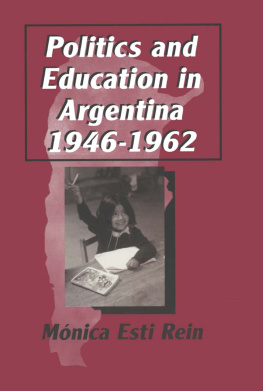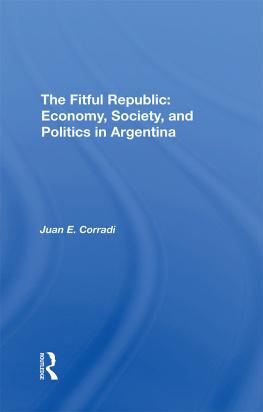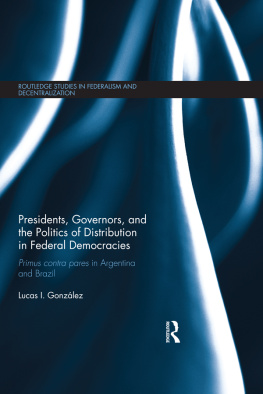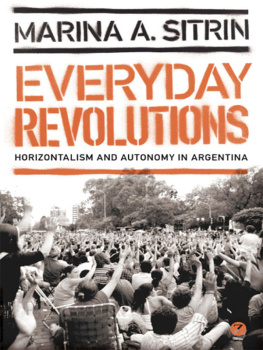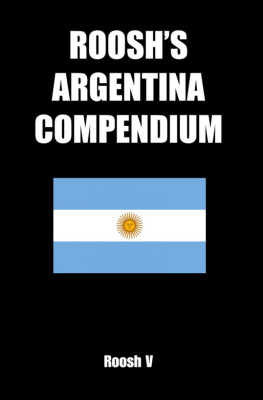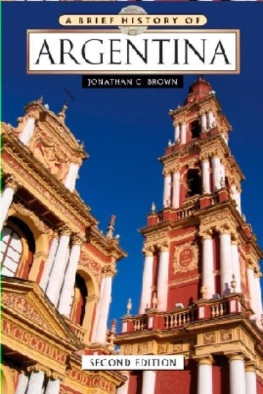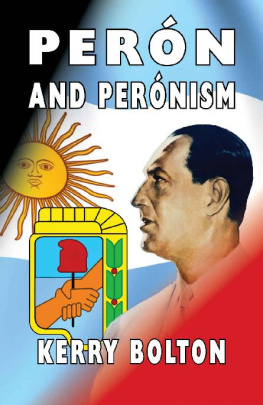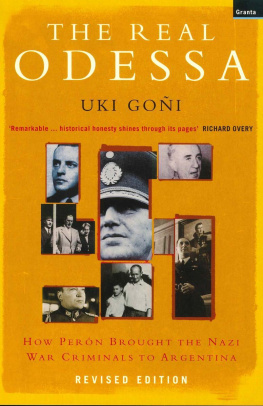Politics and Education in Argentina 1946-1962
L atin
A merican
R ealities
Robert M. Levine, Series Editor
BITITAS DIARY
The Childhood Memoirs of Carolina Maria de Jesus
Carolina Maria de Jesus, Author
Robert M. Levine, Editor
Emanuelle Oliveira and Beth Joan Vinkler, Translators
POLITICS AND EDUCATION IN ARGENTINA, 19461962
Mnica Esti Rein
AFRO-BRAZILIAN CULTURE AND POLITICS
Bahia, 1790s1990s
Hendrik Kraay, Editor
FIGHTING SLAVERY IN THE CARIBBEAN
The Life and Times of a British Family in Nineteenth-Century Havana
Luis Martnez-Fernndez
PILLAGING THE EMPIRE
Piracy in the Americas, 15001750
Kris Lane
THE SWEAT OF THEIR BROW
A History of Work in Latin America
David McCreery
(forthcoming)
THE SWORD OF HUNGER
A Latin American History
Roberta Delson and Robert M. Levine
(forthcoming)
Politics and Education in Argentina 1946-1962
Mnica Esti Rein
Translated by Martha Grenzeback
First published 1998 by M.E. Sharpe
Published 2015 by Routledge
2 Park Square, Milton Park, Abingdon, Oxon OX14 4RN
711 Third Avenue, New York, NY 10017, USA
Routledge is an imprint of the Taylor & Francis Group, an informa business
Copyright 1998 Taylor & Francis. All rights reserved.
No part of this book may be reprinted or reproduced or utilised in any form or by any electronic, mechanical, or other means, now known or hereafter invented, including photocopying and recording, or in any information storage or retrieval system, without permission in writing from the publishers.
Notices
No responsibility is assumed by the publisher for any injury and/or damage to persons or property as a matter of products liability, negligence or otherwise, or from any use of operation of any methods, products, instructions or ideas contained in the material herein.
Practitioners and researchers must always rely on their own experience and knowledge in evaluating and using any information, methods, compounds, or experiments described herein. In using such information or methods they should be mindful of their own safety and the safety of others, including parties for whom they have a professional responsibility.
Product or corporate names may be trademarks or registered trademarks, and are used only for identification and explanation without intent to infringe.
Library of Congress Cataloging-in-Publication Data
Rein, Mnica, 1960
Politics and education in Argentina, 19461962 / Mnica Rein ; translated by Martha Grenzeback.
p. cm. (Latin American realities)
The manuscript of this work was translated from Hebrew into English.
Based upon authors doctoral dissertation at the University of Tel Aviv.
Includes bibliographical references (p. ) and index.
ISBN 0765602091 (hardcover: alk. paper). ISBN 0765602105 (pbk.: alk. paper)
1. Politics and educationArgentinaHistory20th century. 2. Education and stateArgentinaHistory20th century. 3. EducationPolitical aspectsArgentinaHistory20th century. 4. ArgentinaSocial conditions19451983. 5. ArgentinaPolitics and government1943 I. Title. II. Series.
LC92.A6R45 1998
379.82dc21
9729381
CIP
ISBN 13: 9780765602107 (pbk)
ISBN 13: 9780765602091 (hbk)
To Raanan, Omer, and Noa
Contents
The Latin American Realities series presents aspects of life not usually covered in standard histories that tell the stories of governments, economic development, and institutions. Books in this series dwell on different facets of life, equally important, but not often analyzed or described. How have underground economies worked? What strategies have poor people employed to cope with hardship and to improve their lives? How have government policies impacted everyday life? What has been the importance of popular culture? How have members of minority or disadvantaged peoples in Latin Americablacks, recent immigrants, indigenous peoples, men and women of intermediate racial statusfared? How have social and economic changes affected them?
Juan Pern not only dominated Argentine life during the 1940s and 1950s but well after his political eclipse; in fact, the shadow of peronismo lingers over Argentina today. The Pern years, moreover, have entered our popular culture with the successful Broadway play Evita and its beautifully-photographed (but otherwise historically inaccurate) screen version, starring none other than Madonna as Eva Pern.
Mnica Rein offers us a vastly detailed analysis of the Pern years. She is marvelously suited to write this book: as she notes, she grew up on the banks of the Ro de la Plata until her family emigrated to Israel in the early 1960s, and she returned to the Paris of Latin America at the end of the 1980s and the beginning of the 1990s for her research. She studies Perns Argentina, moreover, through the prism of an institutional case study of the countrys education system. As such, she allows us to see how Perns programs and reforms touched the lives of ordinary families. Children in Perns Argentina were expected to learn the principles of Perns ideology, and his presence as dictator always hovered over the school system, influencing the way children came to see the State. Years later, many of the children educated in the peronista school system woke up, as the author notes, to agitate for Perns return to power. This gracefully written, ably translated book breaks new ground by analyzing Pern and his legacy in the context of everyday Argentine life.
Robert M. Levine
This book is the end product of several years of research, and unites my interest in history and my commitment to the field of teaching and education. Argentina itself interested me even beyond its potential as an academic subject: In many respects, my choice of topic reflected my wish to learn more about my birthplace and its culture, to revisit those scenes of my early childhood which had vanished from my memory, left behind on the banks of the Rio de la Plata when my family emigrated from Argentina at the beginning of the 1960s.
My sojourn as a researcher in the Paris of Latin America brought me happiness on one hand and disappointment and sadness on the other. Buenos Aires at the end of the 1980s and in the first half of the 1990s was no longer the same glittering city familiar to me from my familys stories and memories. And although every historian knows that personal memories must be approached with caution, there is no denying that even after the repressive regime of the generals finally gave way to democracy in the early 1980s, Argentina continued to suffer from a damaging series of economic, social, and political upheavals.
My research took me back to the 1940s and 1950s, a period fast receding yet recent enough so that people who had lived through those years were still able to recall them. Again, such memories make heavy demands on the prudence and accountability to which historians are pledged; but they helped me fill in the picture and, in particular, realize the intensity of the feelings that the word Peronism elicits even today in Argentina.

